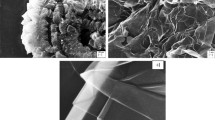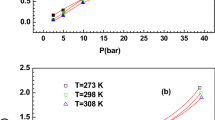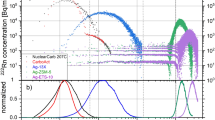Abstract
IN the course of experiments designed to determine the specific activity of nitrogen-16 in the carbon dioxide coolant of a Calder Hall nuclear reactor, it was discovered that this nuclide is adsorbed on various surfaces in the presence of overwhelmingly large concentrations of the carbon dioxide carrier gas. Adsorption occurred at room temperature on copper, iron, rust and graphite, being strongest on the last two materials. Sorption on to aluminium and polythene was negligible. The present communication describes preliminary experiments to establish the basic nature of the adsorption process. In these experiments a graphited surface, such as is common within a nuclear reactor, was chosen as adsorbent.
This is a preview of subscription content, access via your institution
Access options
Subscribe to this journal
Receive 51 print issues and online access
$199.00 per year
only $3.90 per issue
Buy this article
- Purchase on Springer Link
- Instant access to full article PDF
Prices may be subject to local taxes which are calculated during checkout
Similar content being viewed by others
References
Crouthamel, J. A., Applied Gamma-ray Spectrometry (Pergamon Press, London, 1960).
Low, M. J. D., Chem. Rev., 6, 267 (1960).
Author information
Authors and Affiliations
Rights and permissions
About this article
Cite this article
FRENCH, R. Sorption of Nitrogen-16 on Graphite. Nature 212, 1457–1458 (1966). https://doi.org/10.1038/2121457a0
Issue Date:
DOI: https://doi.org/10.1038/2121457a0
Comments
By submitting a comment you agree to abide by our Terms and Community Guidelines. If you find something abusive or that does not comply with our terms or guidelines please flag it as inappropriate.



